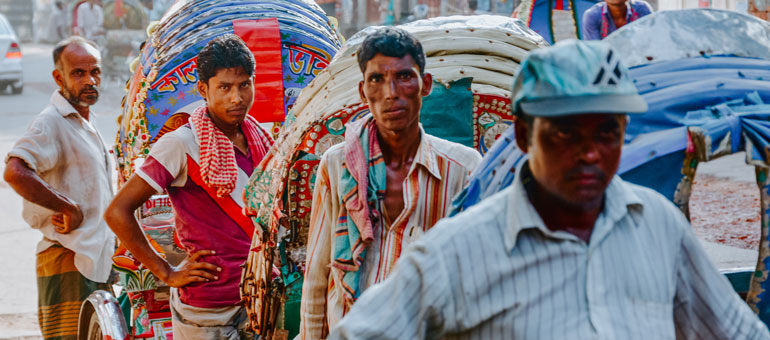Ever since Khadiza Binte Asad was a child, she has enjoyed the sights, sounds, and products of the Islambagh City Corporation Wet Market. Now 22 years old, she is a student of Dhaka Eden College and has been living in the Islambagh area with her family since the age of five. The wet market is not far from her home, and for the last 13 years, she’s visited the market either alone or with her father to buy daily necessities.
Last year, when the global COVID-19 pandemic hit, Khadiza’s family was uncertain about where and how to continue their shopping. Like millions around the world, they were afraid to visit a market known for its multitudes of people and lax hygiene standards. Before various lockdown periods, as Khadiza continued to purchase necessary nutritious foods at the market, she noticed that no market vendors were wearing sanitary face masks and that fellow consumers were not following social distancing protocol. That summer, after GAIN’s emergency KFMW programme launched at Islambagh City Corporation Wet Market, Khadiza says she saw things begin to change.

Like millions around the world, they were afraid to visit a market known for its multitudes of people and lax hygiene standards.
One day while shopping, two people approached her and asked about changes in the market. They were with EatSafe, a complementary GAIN project that conducts bimonthly surveys and data collection to inform the KFMW programme’s market infrastructure audits and improvements. Since then, Khadiza has looked forward to regularly providing her impressions and feedback to project teams and seeing results to match.
Recently Khadiza said, "Now I get pure drinking water in the wet market, but previously it was not available. I also can use a separate female toilet. Vendors are using masks. At every shop, there is a social distancing barrier system. Health, safety, and cleanliness are maintained properly in the market." In addition, she said that the availability and quality of fresh and nutritious food items had increased among vendors.
Despite the workload of her studies and other commitments, Khadiza has invested time and energy regularly participating in various training and workshops that inform the KMFW programme. She says she has learned a great deal about the coronavirus, its preventive safety measures, and other food safety tips. It’s clear to Khadiza how much strategic collaboration is happening daily at the wet market to keep safety measures strong and to engage consumers.
Now I get pure drinking water in the wet market, but previously it was not available. I also can use a separate female toilet. Vendors are using masks.
"Most of the time when I visit Islambagh market, I notice market committee members are active in monitoring the vendors and consumers’ activity….Thanks to these measures through GAIN, Islambagh market committee does not allow any consumer to enter without a mask. As a consumer, I am very much satisfied," Khadiza said.
In this context, Khadiza is more than a student and avid learner invested in COVID-19 awareness - she is also an educator. Khadiza makes a point of sharing the information she’s collected via market activities with family, friends, and neighbours so that they, too, can benefit along with their extended networks. Khadiza’s position as a neighbourhood consumer is a powerful one for the continued success of the KFMW programme.
Through the testimony of her long-time and recent experiences at the Islambagh City Corporation Wet Market, GAIN and its partners are able to make safety and infrastructure improvements that much better.